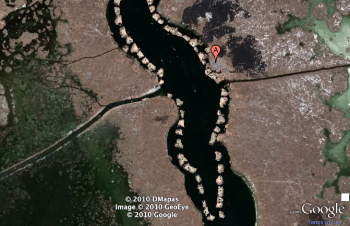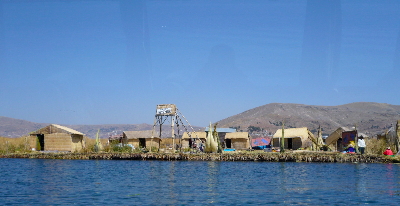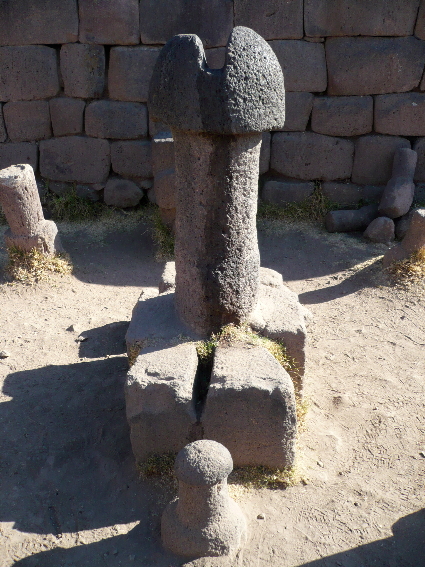
Two fascinating trips today: to the floating Uros islands, and to the Aymara/Inca fertility temple at Chucuito. The Uros islanders, although their own language is lost now, and they have absorbed some of the physical characteristics of the Aymara as well as their language, are nonetheless still distinguishable by their short, squat bodies, their barrel chests with powerful hearts and lungs, and their ‘black blood’ – in truth just a little darker, but proven to have a higher haemoglobin content than sea-level dwelling people like me – and probably you. These people have been here a very long time, and have completely adapted to this environment. The Pukara people (more on them tomorrow) were the first recognisable ‘culture’ or ‘civilisation’ here, between 200 and 600CE, and they were gradually displaced by the Tihuanaco, who were then forcibly conquered by the Aymara, who were in their turn
conquered by the Inca, and lastly, in the 1530s, by the Spanish. The
Uros Islanders, therefore, have been there a long time.



This was my morning trip, and on my way back I enjoyed the views of the lake, and took a little oxygen on board
The Uros Islanders – only a few hundred of them now live there on the islands still – clearly exist mainly on the income from tourists, above and beyond their traditional subsistence existence making their land, their huts, their fires, and their soup out of the reeds in the lake. My guide was very informative, but it was clear enough to the eye that much of their lives are now geared toward the tourists. It was also clear, during these years of world economic turmoil, that the tourist trade has really suffered. The two arms of the village, north and south, have been taking it in turns, this year, to receive tourists, each
morning. In a normal year, both arms receive tourists all day. So I
decided that if I was going to spend my tourist dollars on textiles and
reed figures anywhere in Peru, then it was going to be here, rather than
a shop in Lima or Cuzco. I spent about £65 and the couple were clearly
delighted – she gave me a hug and kiss in a quite spontaneous gesture.
It was somewhere between gratifying and embarrassing – still not sure
quite where. So now I have a delightful, ‘primitive’ Andean tapestry
depicting Pacha Mama and Pacha Tata (Father Earth), along with a puma, a reed boat, and the ubiquitous Tumi knife with which the sacrifices were
made. This was woven by the woman who kissed me. I also have a small
replica reed boat, made by her husband. Lastly, I have one of those big
seed pod maracas, with a scratchboard, covered with some carving, which
looks to me rather mass produced, but never mind. These items will
retain both a memory of meeting their makers, on their island, and the
sort of charitable glow to make any tourist feel his conscience is
clear.
After some soup and a midday sleep back at the hotel, my guide came to
collect me again and we set off to Chucuito, a tiny but charming village
further down the coast toward Bolivia, where there was an Aymara/Inca
fertility temple. Much of it destroyed by the Spanish, of course, who
used the phallic totems to tie their horses in the yards of their
colonial houses around the lake, until in the last decade or so the
local authorities have gradually repatriated them all and set them up
again inside the temple. There is a strange and imposing looking hotel
in front of the temple, where mystical but infertile tourists come from
all over the world to take part in ceremonies, led by the hotelier, at
the temple, apparently with some success, though my guide reckons its
all psychological. The signs of recent libations on the main phallic
altar are clear enough.

